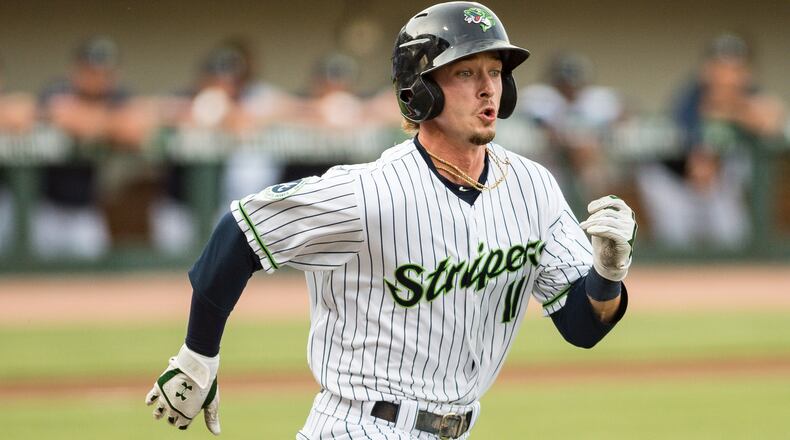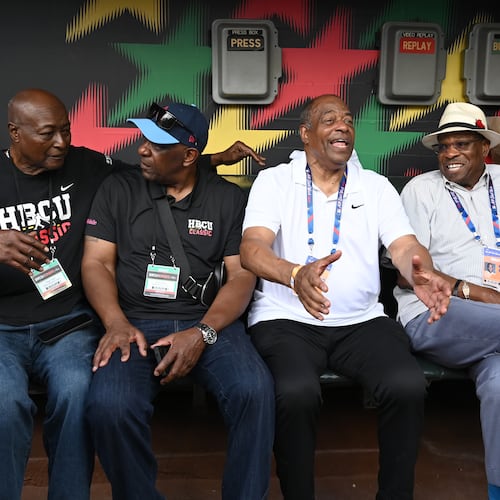When speaking with the AJC before the Futures game in Denver earlier this month, Braves outfield prospect Drew Waters said he wouldn’t view his up-and-down season the same as many have. Since then, he’s caught fire.
Waters, 22, is hitting .256/.346/.439 with 15 doubles, eight homers and 27 RBIs across 56 games at Triple-A Gwinnett. He had an underwhelming first half, but the last month has shown why Waters is still regarded as one of the top outfielders in the minors.
The switch-hitter managed only a .188/.307/.219 slash line in June. He began July hitting .218/.327/.320 overall. But he’s been on a tear this month, hitting .313/.368/.638 with nine doubles, five homers and 17 RBIs.
Just as Waters’ star seemed to be losing some shine, he’s emphatically re-established himself. Waters said he kept a level-headed approach through his struggles, knowing he’d come out wiser on the other side.
“I think I would assess (my season) a little differently than most,” Waters said in Denver. “I would say this: Coming off the pandemic last year, I feel like I got off to a little slower start than usual. But really, it’s been my best season from the standpoint of, I’ve always been one to go out there and do my thing, but I never really knew how. And so I slumped for a little bit at the beginning, but it really forced me to still make an impact throughout the game (in other ways).
“I was trying to make an impact on defense, on the bases whenever I got the opportunity to. Now, I feel like I’m finally getting to that point where I’m back to being Drew Waters. I think struggles are good because they teach you a lot. Now I know what I need to do to be successful. I’m excited for the next time I get to struggle because hopefully I learn something else. Hopefully I continue to grow as a player.”
The Woodstock native has his obstacles. His strikeout numbers, which concern evaluators, are excessive. He’s an overly aggressive hitter and frequently whiffs in the upper part of the zone. Improved plate discipline could come in time, but it’s the No. 1 concern with him right now.
His natural talent is compelling. Waters won the Double-A Southern League’s MVP award, and batting title, in 2019, when he hit .319 with 25 doubles, nine triples and five homers over 109 games. He drew positive reviews at the alternate site as he continued working on his right-handed swing. Since the Braves selected Waters in the second round of the 2016 draft, he’s steadily climbed their prospect rankings.
Outfielder Cristian Pache and starter Ian Anderson were the franchise’s only prospects ranked above Waters entering the season, per Baseball America. Emerging star prospect Michael Harris has dominated in High-A Rome, and many believe Harris, who generated plenty of hype in the spring, will ultimately prove a better prospect than Waters.
Perhaps that makes Waters expendable should the Braves seek big-name help during Friday’s deadline or in the winter. But the team has clung to its higher rated prospects under general manager Alex Anthopoulos and, at this point, it might behoove them to give Waters a further look.
Pache struggled in the majors, resulting in his demotion to Triple-A, where he’s patrolling the outfield with Waters. Prospects can be hard to figure out – look at lefty Kyle Muller, whose years of command issues have suddenly disappeared in the majors.
While Waters is flawed, his base talent level should make him a long-time major leaguer. The profile: A switch-hitter who plays steady outfield defense and possesses above-average speed. Waters is 16-for-22 in steal attempts this season. He probably won’t be a thumper, but he projects to have solid power, too.
How Waters’ next month develops – along with perhaps how the Braves’ season unfolds – could determine whether he sees the majors this season. Until then, whenever that call comes, Waters hopes to continue improving the physical and mental aspects of his game.
“I’m focusing on where my feet are today and trying to be the best player I am today,” Waters said. “That’s definitely a goal of mine, to be in the big leagues help the Atlanta Braves win. And now, you know, I thought I was ready after my 2019 season and what I was able to do, statistically and all, but looking back, I was nowhere even close. Partially because I had never struggled in my minor-league career. And I think there’s a lot to say about a struggle.
“It really makes you learn. Learn your ability and learn your craft on such a different level where you, in a way, become your own coach and become that professional that you see other big-league players being. It’s being that true professional. Having professional at-bats, knowing where to throw the ball when the ball is hit to you. You go 0-for-2, what are you going to do that third at-bat and make the adjustment to get a different result. And I feel like I’m finally at that point where I understand what I’m doing and what makes me successful. Whereas before, it was all just kind of a natural ability.”
About the Author
Keep Reading
The Latest
Featured



